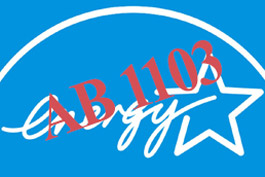 Assembly Bill 1103 (AB 1103) is the California bill requiring non-residential building owners and operators to disclose energy benchmarking data to prospective lessees, buyers or lenders when the building is sold, financed or leased in full. Originally signed into law nearly six years ago, it will go into effect September 1, 2013.
Assembly Bill 1103 (AB 1103) is the California bill requiring non-residential building owners and operators to disclose energy benchmarking data to prospective lessees, buyers or lenders when the building is sold, financed or leased in full. Originally signed into law nearly six years ago, it will go into effect September 1, 2013.
What does this mean?
Anytime a property is preparing to be financed, sold, or leased, ownership is required to run ENERGY STAR numbers and provide the information to all parties involved in the transaction, as well as to the Energy Commission.
Who should care?
All commercial building operators, property managers, real estate brokers, as well as owners and consultants will be involved in the process which will likely be a time-intensive, first-time effort. Ownership and management (via in-house or third party) should stay ahead of the game and engage in the process in advance of pursuing financing or putting the property on the market for lease or sale.
What to do next?
It is time to get prepared!
The legislation requires the submittal of three documents to prospective buyers, lenders or lessees: (1) Statement of Energy Performance, (2) Data Checklist, and (3) Facility Summary. All documents are prepared through the Energy Star Portfolio Manager.
Our Coreland Management team has begun to engage our clients on properties soon to be leased, sold or financed. As a result, we have compiled a Top 5 “Need To Know” list to help get the process started:
1. Review your portfolio and evaluate if you will be affected. Will you be selling or refinancing in the near future? Are you preparing to lease a single-tenant space over 5,000 square feet?
2. Know your timeline. The process, which includes a request to utility companies to provide energy use data, can take 30-60 days. Disclosure documents are due 24 hours before a property is sold, leased or financed, and the report is only valid for 30 days.
3. In regards to single-tenant leased buildings, the mandate applies to new leases as well as renewals. The law will be phased in over the next 12 months, depending on the size of the property. Buildings over 50,000 square feet are required to comply by September 1, 2013; over 10,000 sf to comply by March 2013; and over 5,000 sf to comply by September 2014.
4. Energy data must be collected for all individual tenants, and each tenant must grant permission for the disclosure. This is the most time consuming aspect, thus management teams should prioritize the task.
Please note that the California Energy Commission (CEC) is currently drafting a letter of advice that would recommend that the utility companies upload the aggregate consumption directly into the Energy Star Portfolio Manager, thus bypassing the need for individual tenant authorization.
5. Use the information to your advantage. An Energy Score of 50+ (ratings are from 1 to 100) indicates that a building is more energy efficient than most. Buildings that score 75+ can apply for an ENERGY STAR certification. There will be no penalty for low ratings.
For additional tools and resources, visit ENERGY STAR for Retail.

